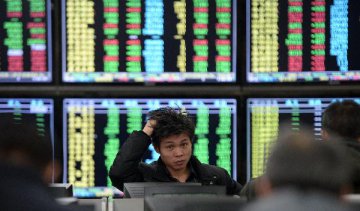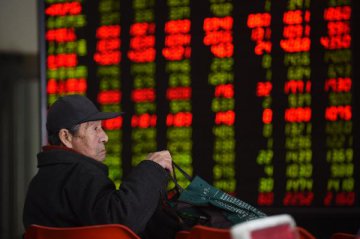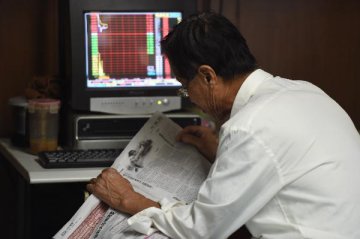
The S&P 500 has regained some of the ground it lost last week, but it is experiencing more gyrations on Wednesday. So far this week, the index is up by 1 percent, after falling by about 5 percent between Oct. 8 and Oct. 12. But don't get ready to celebrate just yet – slowing Chinese growth could send global markets on another wild ride.
According to most experts, last week's decline was due to the rise of the 10-Year Treasury yield, which spiked to 3.2 percent. But there may have been another reason as to why stocks fell: On Oct.8 the International Monetary Fund downgraded both Chinese, American and global GDP growth for 2019. China's economy, it said, will grow by 6.2 percent next year, down from 6.6 percent this year, while America's GDP will expand by 2.5 percent in 2019, slower than the 2.9 percent it's expected to grow by this year.
Liu Chang, an economist specializing in China with Capital Economics, thinks growth could be even slower. "We think actual growth now is 5.5 percent instead of 6.7 percent," he said. "And our measure has growth slowing more next year."
Slowdown impacts everyone
As we've seen in the past, what happens in China tends not to stay in China, at least from a market perspective. With the U.S. already putting tariffs on $250 billion worth of Chinese goods, and President Trump threatening to slap tariffs on billions of more imports, the country's stock market has taken a tumble. On Wednesday, Trump announced the U.S. would pull out of a global postal treaty that allowed Chinese companies to ship goods to U.S. consumers at deeply discounted rates. The Shanghai Stock Exchange Composite Index is down about 22 percent since January.
Other emerging markets have also been dragged down, in part by China's slower growth. The iShares MSCI South Korea ETF is down 17.44 percent since January, while the iShares MSCI Hong Kong ETF and the iShares MSCI Taiwan ETF have dropped 13.4 percent and 6.8 percent, respectively. Emerging markets have declined as a whole, with the iShares MSCI Emerging Markets Index falling by 14.6 percent this year.
Markets often react negatively to slowing Chinese growth for several reasons, but a main one is due to its size: it's the second-largest economy in the world. If it slows down, so too does global growth, says Louis Lau, director of investments group at Brandes Investment Partners.
Chinese consumers also buy a large portion of luxury goods around the world, it's a big consumer of oil and other commodities and many countries and districts, like South Korea, Taiwan and Germany have a robust trade relationship with China. In fact, the EU is China's largest trading partner. "If Chinese demand falls off, then that has a definite impact on global growth," Lau said.
China's debt-ridden economy
There's another, potentially larger issue, facing China – its indebted economy could get worse if growth slows more dramatically. After the recession, the country spend trillions of dollars building infrastructure causing it debt-to-GDP ratio to skyrocket to above 260 percent. "That's a high number," Lau said.
As well, non-performing loans, which are loans that are not being paid back, could hit a reported $476 billion by 2020. If corporate defaults rise, and if its $20 trillion shadow banking industry isn't reigned in – the shadow banking sector sells opaque asset management products to the public and companies – then investors could start running scared. "You could see investors bail out of China," Lau said. "If assets default, we could see Chinese markets fall further than they have already."
In a worst-case scenario, if Chinese banks start to suffer – because of non-performing loan defaults and slower than expected growth – then global banks operating in China, like HSBC or JPMorgan Chase, which have relationships with the big Chinese banks, could be in trouble. "I don't see this as a huge issue, but global banks do have exposure to Chinese banks and a failure could then affect the global banking system."
Currency is something else Chang and Lau are keeping an eye on. If investors think that the renminbi might fall more than it has already – it's down about 9 percent against the U.S. dollar this year – then that could create panic in the markets.
Chang does think the renminbi will fall further, to about 7.3 from the 6.9 it's at today, but any further depreciation could be a problem. "If the market thinks that China is weaponizing the renminbi or devaluing it, then we could see capital outflows surge," he said. "That's destabilizing."
Neither Lau or Chang think things will not get bad enough to cause a market panic, but slowing growth is always something to pay attention to, especially if the U.S.-China trade war escalates. Chang thinks the Chinese economy will stabilize by 2020, but there could be a lot of ups and downs until then. "If tariffs go up, or if Trump imposes tariffs on all of China's imports then that would be a big headwind," he said.
Source: CNBC
























Latest comments